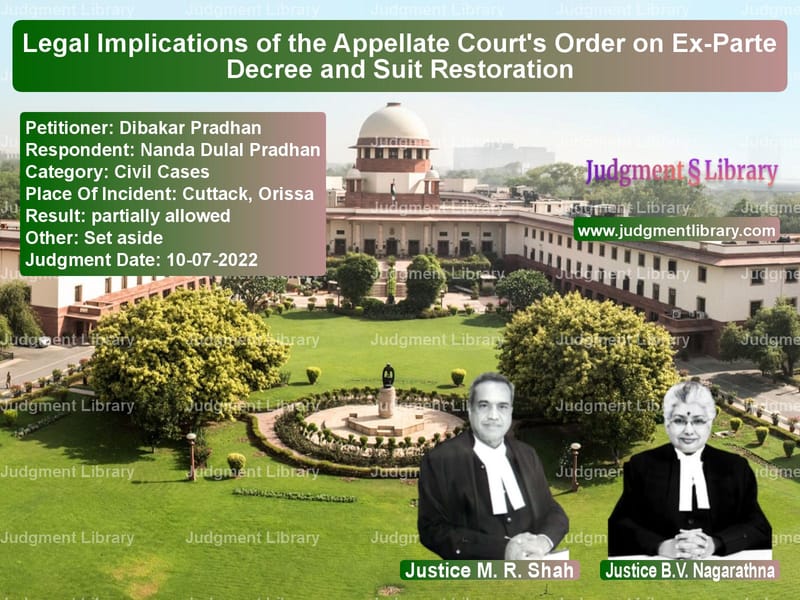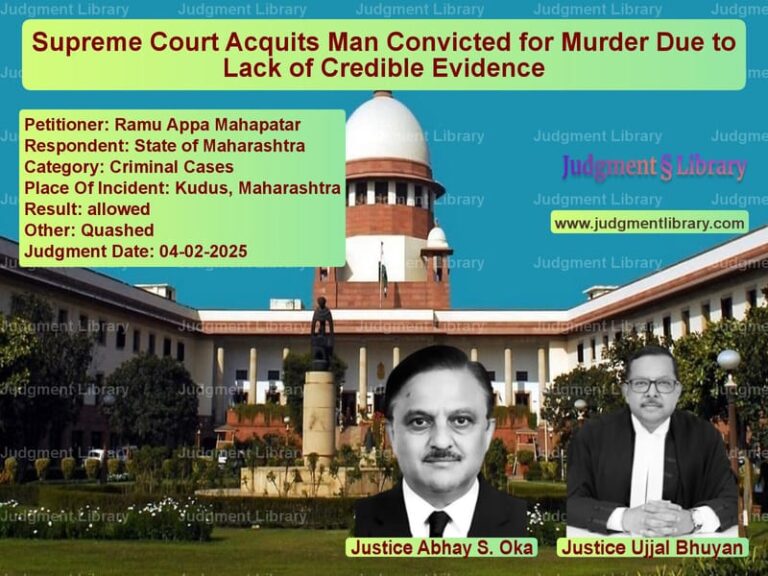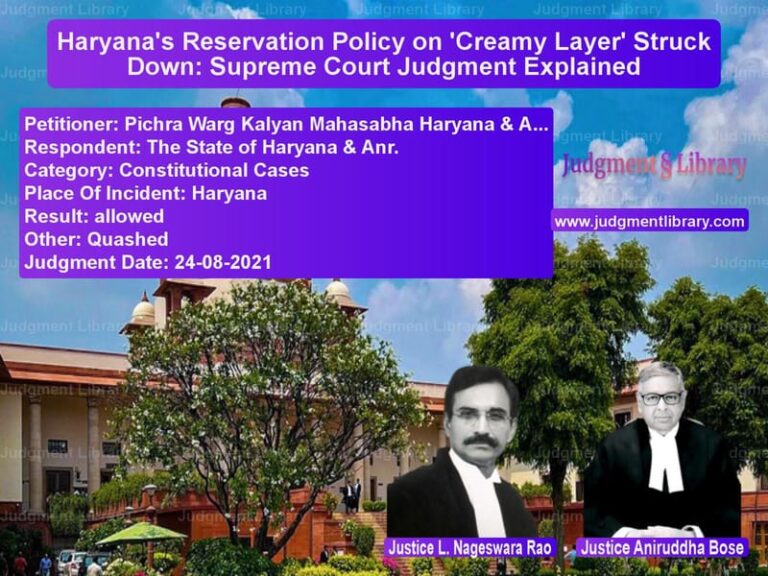Legal Implications of the Appellate Court’s Order on Ex-Parte Decree and Suit Restoration
The case of Nanda Dulal Pradhan & Anr. vs. Dibakar Pradhan & Anr. involves the appeal against the order passed by the High Court of Orissa at Cuttack, which dealt with the issue of setting aside an ex-parte judgment and decree in a civil suit. The appellants, who were the original defendants in the case, had been denied the opportunity to file their written statement due to multiple absences and delays. The original defendants subsequently filed an application under Order IX Rule 13 of the Civil Procedure Code (CPC) to set aside the ex-parte judgment. However, their application was initially dismissed by the trial court. The First Appellate Court reversed this decision, allowing the appeal and directing the restoration of the suit, thereby giving the defendants another chance to contest the case. This led to the filing of the present appeal by the plaintiff, challenging the appellate court’s decision.
Background of the Case
The plaintiff, Dibakar Pradhan, had filed a civil suit in 2003 in the Court of Civil Judge (Junior Division), Jaleswar, seeking a declaration of title over a piece of land. The appellants, who were the original defendants, were made parties to the suit. However, the defendants failed to file their written statement within the prescribed time limit despite several opportunities. As a result, the trial court proceeded with the case ex-parte and passed a judgment and decree in favor of the plaintiff in 2004.
The defendants then filed an application under Order IX Rule 13 CPC in 2005, seeking to set aside the ex-parte judgment and decree. The trial court dismissed their application, ruling that they had failed to show sufficient cause for their absence. The appellants then appealed to the First Appellate Court, which allowed the appeal and set aside the trial court’s decision. The First Appellate Court restored the suit, granting the appellants the opportunity to present their evidence and cross-examine witnesses. This order was challenged by the plaintiff before the High Court of Orissa, which reversed the appellate court’s decision, arguing that since the defendants had failed to file their written statement, reopening the suit would be futile.
Legal Issues in the Case
- Whether the First Appellate Court was correct in setting aside the ex-parte judgment and restoring the suit, allowing the defendants to contest the case.
- Did the High Court err in reversing the order of the First Appellate Court and not considering the sufficient cause shown by the appellants for their absence?
- What is the appropriate legal recourse when a party fails to file a written statement and seeks to set aside an ex-parte decree?
- Does the restoration of the suit, without allowing the filing of a written statement, violate the principles of justice and fairness?
Arguments by the Petitioner (Dibakar Pradhan, Respondent)
- The petitioner argued that the defendants had been given multiple opportunities to file their written statement but had failed to do so, and thus, the ex-parte decree should stand.
- The petitioner contended that allowing the defendants to participate in the suit after such a long delay would be an abuse of the legal process and would set a bad precedent.
- The petitioner also argued that the First Appellate Court had failed to properly consider the procedural implications of restoring the suit and allowing the defendants to present their case.
Arguments by the Respondent (Nanda Dulal Pradhan & Anr., Appellants)
- The appellants argued that they had sufficient cause for their absence and that they had not been deliberately negligent in failing to file their written statement.
- The appellants contended that the First Appellate Court had rightly observed that the trial court’s decision was unjust, and they were entitled to a fair opportunity to defend themselves.
- The appellants emphasized the importance of justice and fairness, arguing that the ex-parte decree should be set aside to allow them to present their case properly.
- They argued that their failure to file a written statement was not a matter of willful neglect but was caused by unforeseen circumstances, which they had made efforts to explain in their application.
Supreme Court’s Observations
- The Court noted that the issue at hand was whether the First Appellate Court was justified in allowing the restoration of the suit and setting aside the ex-parte judgment and decree.
- The Court also emphasized the need for a fair opportunity to be given to both parties to present their case, as long as there was a valid cause for the failure to appear or file the written statement.
- In analyzing the High Court’s decision, the Court observed that the High Court had not adequately considered the findings of the First Appellate Court regarding the sufficient cause for the appellants’ absence.
- The Court highlighted the principles laid down in earlier judgments such as Sangram Singh v. Election Tribunal, which emphasize that a party should be given a fair chance to contest a case, especially when it can demonstrate valid reasons for its failure to comply with procedural requirements.
- The Court also reiterated that setting aside an ex-parte decree and restoring the suit was not an automatic process but should be determined based on the facts of each case and the interests of justice.
The Court ruled:
“In light of the circumstances, the impugned judgment and order passed by the High Court is set aside. The order of the First Appellate Court is restored, and the defendants are given the opportunity to contest the suit, provided they do not file a written statement. They are, however, permitted to participate in the suit proceedings and cross-examine witnesses.”
Final Judgment
The Supreme Court issued the following directives:
- The High Court’s order is set aside, and the First Appellate Court’s order is restored.
- The appellants (defendants) are not allowed to file a written statement but may participate in the suit, cross-examine witnesses, and make submissions on merits.
- The suit is restored and will proceed in accordance with the law.
- There is no order for costs, given the circumstances of the case.
Implications of the Judgment
- The ruling reinforces the principles of fairness and justice, particularly in civil proceedings where a party may be denied the opportunity to file a written statement due to absence or neglect.
- The decision highlights the importance of providing a second chance to parties to contest a case, ensuring that the procedural errors do not bar the right to a fair hearing.
- The judgment also sets a precedent for future cases where the fairness of procedural decisions is at stake, particularly concerning ex-parte decrees and the restoration of suits.
- This case may also influence the application of procedural law and the discretion of appellate courts in reversing ex-parte decrees.
This judgment upholds the sanctity of justice and fair play, ensuring that legal proceedings are conducted with due regard for the rights of all parties involved.
Petitioner Name: Dibakar Pradhan.Respondent Name: Nanda Dulal Pradhan.Judgment By: Justice M. R. Shah, Justice B.V. Nagarathna.Place Of Incident: Cuttack, Orissa.Judgment Date: 10-07-2022.
Don’t miss out on the full details! Download the complete judgment in PDF format below and gain valuable insights instantly!
Download Judgment: dibakar-pradhan-vs-nanda-dulal-pradhan-supreme-court-of-india-judgment-dated-10-07-2022.pdf
Directly Download Judgment: Directly download this Judgment
See all petitions in Contract Disputes
See all petitions in Landlord-Tenant Disputes
See all petitions in Specific Performance
See all petitions in Judgment by Mukeshkumar Rasikbhai Shah
See all petitions in Judgment by B.V. Nagarathna
See all petitions in partially allowed
See all petitions in Set Aside
See all petitions in supreme court of India judgments July 2022
See all petitions in 2022 judgments
See all posts in Civil Cases Category
See all allowed petitions in Civil Cases Category
See all Dismissed petitions in Civil Cases Category
See all partially allowed petitions in Civil Cases Category







